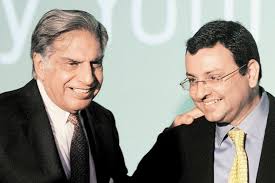
The Board of Tata Sons (the holding company of Tata group) sacked Cyrus Mistry as its chairman less than 4 years after he took charge of the top job in the year 2012. His predecessor, Ratan Tata, would step in as interim chairman . In the meanwhile, the group has constituted a selection committee to find a new chairman.
Before discussing the ouster, let us be clear about the structure of Tata Sons. The largest shareholder of Tata Sons (the holding company of the Tata Group) is Tata trusts (philanthropic trusts created by Tata company). It holds a controlling 66% stake in Tata Sons. The chairman of the trust is Ratan Tata. The second dominant shareholder is Shapoorji Pallonji Group (Cyrus Mistry’s family) holding 18 % of the shares.
There have been only six chairmen of the Tata Group in the 148 years of its existence (since it was founded in 1868). Just days before Cyrus Mistry was appointed as chairman, the Articles of Association was amended to give Tata trusts special powers in nominating, approving and removing chairman of the group holding company appointed. A special resolution was passed at Extraordinary General Meeting held on 6th December 2012 to make the necessary amendments.
The group did not cite any particular reason for his ouster. It said in its official statement that it was done keeping in mind the long-term interests of the company and the stakeholders
The Tata group has been struggling with various problems over the last few years. The profitability of Tata Sons was dependent on just two companies—Jaguar Land Rover (JLR) business of Tata Motors and Tata Consultancy Services (TCS). The Tata Group consists of 57 companies, of which 20 make an annual loss regularly.
The future of TCS and JLR is also uncertain because of new advancements in robotic technologies and the slowing Chinese economy which affects the market for cars.
Thus, it became inperative that the salt to software conglomerate divest some of its businesses and focus only on core operations to earn sustainable profits.
In a leaked email to Tata Sons board members , Cyrus Mistry expressed shock at his sudden removal without being given any opportunity to defend himself. He said that his removal “without explanation is unique in the annals of corporate history.” He also levelled a series of serious allegations againts the company. He said that he was writing the mail “to emphasise the total lack of corporate governance and to point out the failure on the part of the directors to discharge the fiduciary duty owed to stakeholders of Tata Sons and of the group companies”.
He retierated that there was a lot of interference in the functioning of the group (by Ratan Tata) and he was pushed into position of ‘lame-duck’ chairman. Mistry also warned of a Rs1.18 trillion writedown (reduction in value of asset), over time, from five unprofitable businesses and questioned various decisions taken prior to his tenure.
Some questions raised were:
- The decision to not shut-down Nano car due to emotional reasons. The cost of manufacturing the car was always above 1 lakhs and it faced losses amounting to 1000 crores.
- The decision to involve itself in two airlines (Air Asia and Vistara) only due to passion of Ratan Tata for airline sector. He also pointed out the fraudulent transactions worth Rs. 22 crores in Air Asia.
- The hotel arms of the group bought property at inflated prices and parked it in off-balance sheet vehicles
- It deferred losses using ‘aggressive accounting’. Aggressive accounting refers to manipulation of accounting statements in order to show higher profits than it actually is. One of the methods used was to capitalise substantial portions of the product development cost and show it as an asset in the balance sheet rather than as an expense.
- Aggressive bidding for Mundra power project
The Tata group response to the email was very generic and vague. They did not give a point to point rebuttal of Mistry’s allegations. They replied that the tenure of former chairman was “marked by repeated departure from the culture and ethos of the group.” But, they did not explain what these ‘departures’ were.
All the information related to the Tata’s decision is not in the public domain. So, it’s a little early to reach a conclusion. But, the sudden decision has led to a lot of speculation in the media and it reflects poorly on the Tata group. Also, Mistry had less than 4 years to affect any turnaround in the company.
Source:
//www.firstpost.com/business/why-cyrus-mistry-was-sacked-saving-house-of-tatas-meant-tarnishing-ratan-tatas-legacy-3073284.html